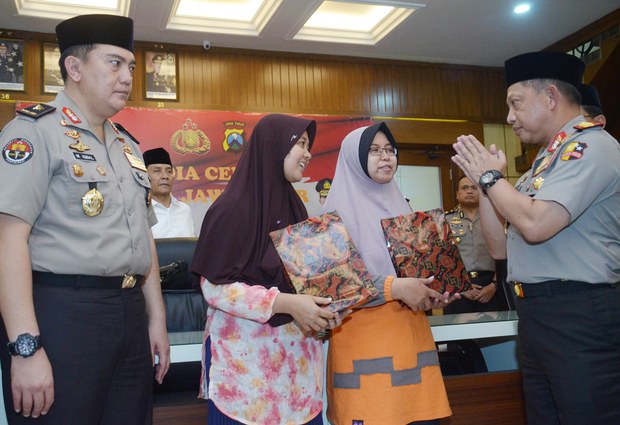Indonesia’s Police Chief Proposes Deploying Anti-Terror Squad Nationwide
2018.06.05
Jakarta
 Indonesian national police chief Tito Karnavian (right) meets with the family and relatives of suicide-bombing victims in Surabaya, East Java, May 15, 2018.
Indonesian national police chief Tito Karnavian (right) meets with the family and relatives of suicide-bombing victims in Surabaya, East Java, May 15, 2018.
Comparing militant ideology to a virus, Indonesia’s police chief on Tuesday proposed to deploy anti-terror squads nationwide, as the largest Muslim-majority country grapples with a string of suicide attacks, including bombings that targeted three churches in recent weeks.
Expanding the presence of the country’s counterterror squad known as Densus 88 to 34 provinces would allow it to respond faster to terror threats or attacks, national police chief Gen. Tito Karnavian told reporters after attending a parliamentary hearing in Jakarta.
“I want to strengthen Densus 88, which so far only has 16 task forces. I want to make it into 34 task forces, one in each province,” Karnavian said.
Special Detachment 88, known locally as Densus 88, was formed after Indonesia’s worst terror attack in Bali in 2002 when bombs killed 202 people, including 88 Australians.
Karnavian issued the statement 11 days after the nation’s parliament strengthened its 2003 anti-terrorism law, allowing police to take preventive measures and formalizing a military role in counterterrorism efforts.
He said the country faced high terror threats because extremist cells and networks had spread to most provinces in Indonesia.
“This terrorist ideology is just like a virus. It can target anybody. It can target all circles just like drugs,” he said.
To fund his plan to deploy anti-terror teams nationwide, Karnavian sought approval from parliament for his proposal to increase the police budget by 44.4 trillion rupiah (more than U.S. $3.1 billion) for next year.
“This needs the approval of the House,” he said.
Indonesia, a nation of 262 million people, has faced a resurgence of recent extremist attacks as security analysts warn of dozens of its citizens returning home after fighting for the extremist group Islamic State (IS) in the Middle East.
In early May, five Indonesian policemen and an inmate were killed after a riot broke out over a food complaint at a prison housing convicted terrorists near Jakarta. Several terrorism-related incidents took place during the same month, including suicide bombings at churches in Surabaya.
In all, 51 people – 13 civilians, seven police and 31 suspects – died, according to a BenarNews count.
Karnavian said 82 suspected terrorists had been arrested in Indonesia following the prison riot.
‘Iceberg’ of radical ideology
Karnavian warned that the recent terror attacks represented only the tip of the iceberg of radical ideology, which was rapidly taking root in the community.
“The ideology spreads by taking the advantage of freedom brought by the democratic system,” he said, explaining that social media had made it easier for militants to communicate.
Indonesia’s move to revise its 2003 anti-terror law on May 25 allows police to take preventive measures and formalizes the military’s role in counterterrorism efforts. It also allows police to preemptively detain suspects for longer periods, according to legal experts.
Police intend to crack down on terrorism and address its ideology, the root cause of the problem, Karnavian said.
“This involves the government; other stakeholders and the community, including mass organizations that need to work together,” he said. “It must be organized in a national action plan to contain and neutralize radical ideologies.”







